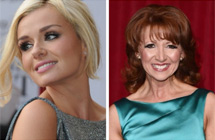道林•格雷效应:你的名字会改变你的容貌
|
告诉我你的名字,我就能猜出你长什么样子。听上去和算命一样玄乎,但这是有科学根据的。研究人员发现,你的名字所附带的社会成见会影响并逐渐改变你的容貌,所以,父母们给孩子取名字时可要多长点心啊! Choosing a name for a child is often a headache for parents, but new research shows that picking well could be more crucial than previously thought. Academics have found that your first name actually changes the way you look, a phenomenon dubbed ‘The Dorian Gray’ effect, after Oscar Wilde’s eponymous hero.
Just as Gray’s wicked deeds were etched onto the facial features of his portrait, so the cultural stereotypes linked to a name come to be written on the faces of their bearers. For example someone called ‘Bob’ is expected by society to have a rounder more jovial face than a man called ‘Tim’. That expectation eventually leads ‘Bobs’ to become more gregarious and jolly, while ‘Tims’ may appear more pinched and reserved. The connection may be linked to the 'bouba-kiki' effect which suggests that across languages, more bulbous smoother objects are labelled with rounded 'bouba' sounds, while thinner spikier objects have 'kiki' sounds. Likewise ‘Winstons’ are perceived as fairly glum, while ‘Marys’ are considered to be moral, both traits which may alter countenance, and over time, change face shape. And a woman named ‘Katherine’ is considered to be more serious and dependable than a girl named ‘Bonnie’. Such cultural expectations may encourage ‘Katherines’ to be more studious and academic, which could gradually influence the development of facial muscles, perhaps through increased concentration.
“For instance, people are more likely to imagine a person named Bob to have a rounder face than a person named Tim. We believe these stereotypes can, over time, affect people's facial appearance." To find out if face shape was linked to name, researchers conducted eight studies to see it was possible for strangers to correctly identify the names of people simply by looking at their faces. In every experiment, the participants were significantly better (up to 40 percent accurate) at matching the name to the face than random chance (20 - 25 percent accurate) even when ethnicity, age and other socioeconomic variables were controlled for. "Together, these findings suggest that facial appearance represents social expectations of how a person with a particular name should look. In this way, a social tag may influence one's facial appearance," said co-author Dr Ruth Mayo. |









